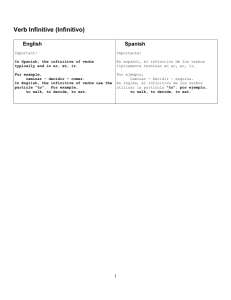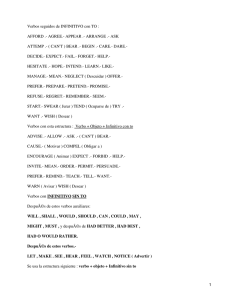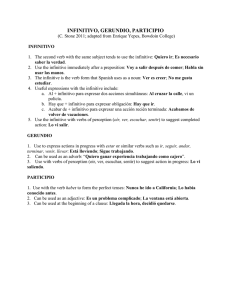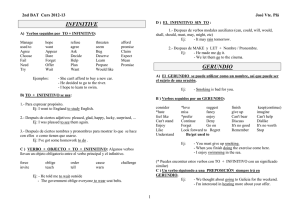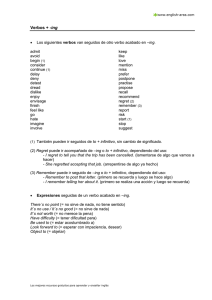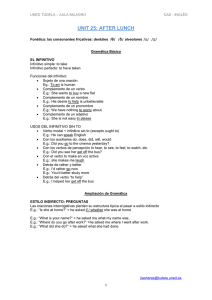- ing and the infinitive
Anuncio
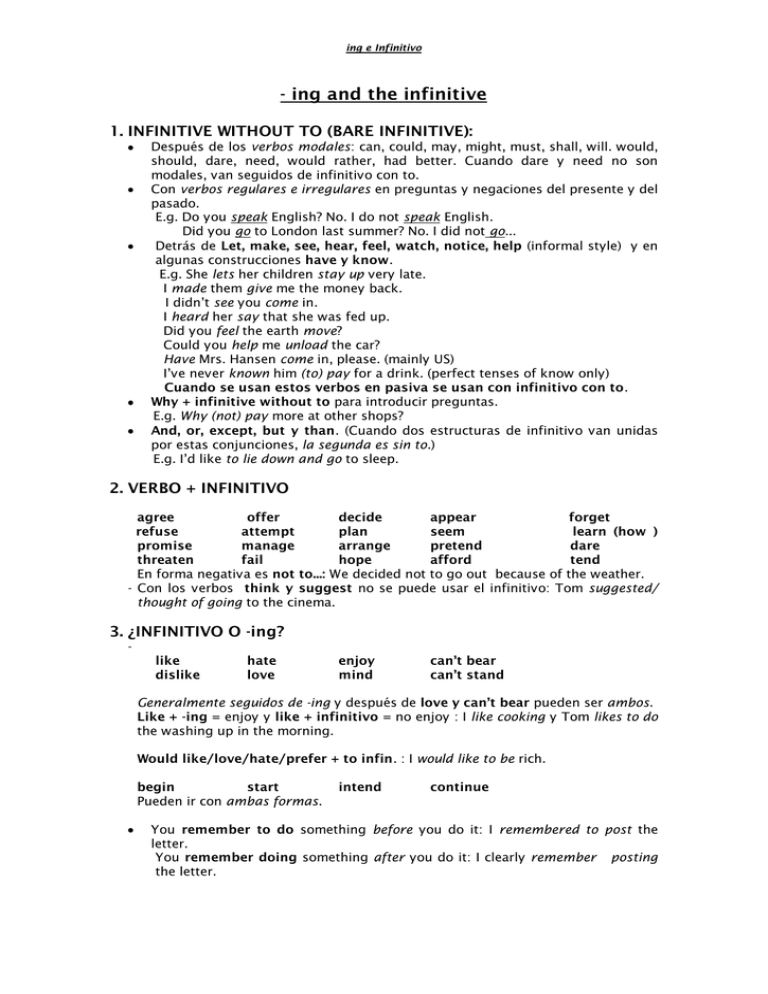
ing e Infinitivo - ing and the infinitive 1. INFINITIVE WITHOUT TO (BARE INFINITIVE): Después de los verbos modales: can, could, may, might, must, shall, will. would, should, dare, need, would rather, had better. Cuando dare y need no son modales, van seguidos de infinitivo con to. Con verbos regulares e irregulares en preguntas y negaciones del presente y del pasado. E.g. Do you speak English? No. I do not speak English. Did you go to London last summer? No. I did not go... Detrás de Let, make, see, hear, feel, watch, notice, help (informal style) y en algunas construcciones have y know. E.g. She lets her children stay up very late. I made them give me the money back. I didn’t see you come in. I heard her say that she was fed up. Did you feel the earth move? Could you help me unload the car? Have Mrs. Hansen come in, please. (mainly US) I’ve never known him (to) pay for a drink. (perfect tenses of know only) Cuando se usan estos verbos en pasiva se usan con infinitivo con to. Why + infinitive without to para introducir preguntas. E.g. Why (not) pay more at other shops? And, or, except, but y than. (Cuando dos estructuras de infinitivo van unidas por estas conjunciones, la segunda es sin to.) E.g. I’d like to lie down and go to sleep. 2. VERBO + INFINITIVO agree offer decide appear forget refuse attempt plan seem learn (how ) promise manage arrange pretend dare threaten fail hope afford tend En forma negativa es not to...: We decided not to go out because of the weather. - Con los verbos think y suggest no se puede usar el infinitivo: Tom suggested/ thought of going to the cinema. 3. ¿INFINITIVO O -ing? - like dislike hate love enjoy mind can’t bear can’t stand Generalmente seguidos de -ing y después de love y can’t bear pueden ser ambos. Like + -ing = enjoy y like + infinitivo = no enjoy : I like cooking y Tom likes to do the washing up in the morning. Would like/love/hate/prefer + to infin. : I would like to be rich. begin start Pueden ir con ambas formas. intend continue You remember to do something before you do it: I remembered to post the letter. You remember doing something after you do it: I clearly remember posting the letter. ing e Infinitivo Try to do = attempt to do; make an effort to do: Please try to be quiet when coming home late. Try doing = do something as an experiment, a test: I tried taking an aspirin. Be afraid to do = I don’t want to do something because it is dangerous or the result could be unpleasant: She was afraid to tell her parents the truth. Be afraid of -ing = There is a posssibility that something bad will happen: I’m always afraid of being bitten by dogs. Need to do = It’s necessary for me to do something: I need to take more exercise. Need -ing = need to be done (El sentido es pasivo): Do you think the grass needs cutting? Help con ambos pero la expresión can’t help doing something = I can’t stop myself from doing something: I tried to be serious but I couldn’t help laughing. Después de preposiciones + -ing excepto: to (generalmente va con el infinitivo pero ¡Ojo! con los siguientes: I look forward to seeing you next summer. I am used to drinking a lot (no confundas be used to + -ing con used to + infin.) Do you object to working on Sundays? I prefer riding to walking. - Expresiones + -ing: It’s no use/ it’s no good ... There’s no point in ... It`s (not) worth ... (Have) difficulty ... A waste of money/ time ... Go -ing (activities/sports)
